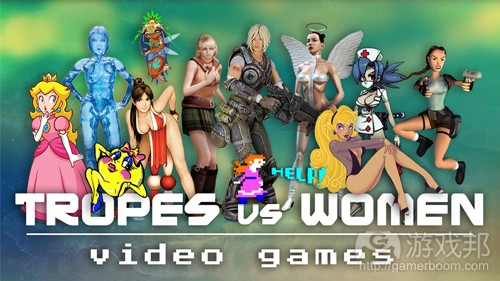游戏并未歧视女性 女性不应抵触游戏
作者:Caroline Murphy
我曾参加GameLoop 2010这个非常有趣的活动,我在此度过了非常愉快的时光。我所参加的第一个活动是“游戏中的女性在咆哮”,参与者可以在此分享他们对于女性在游戏中的待遇(游戏邦注:包括游戏中的角色以及游戏产业中的个人发展)的看法。
有些女性认为将女性角色作为游戏中的性欲对象是一种冒犯行为,或者将伤害到所有女性玩家。而我并不同意这一观点。当然我也看过许多以荒谬的方式描绘女性形象的奇幻游戏,但是难道这不正是我们将其称为奇幻游戏的重要原因吗?
我并不认为在游戏中让女性角色穿上链甲比基尼是阻碍女性玩家进入游戏的因素。我个人认为链甲比基尼是一种非常性感的设计,我非常喜欢它们。我很喜欢看那些拥有美丽外表,衣着暴露且充满性欲的女性图像,我甚至很难想象有人会厌恶这种强大且性感的女性形象。就像我之前出售奇幻图像时就遇到许多男顾客因为怕妻子不高兴而不敢买那些较为暴露的图像(即使他们内心非常喜欢)。难道他们妻子是嫉妒这些图像上的女性吗?还是她们怕图像中的这些女人会篡夺自己在丈夫心中的地位?或者说我们处在一个极端禁欲的文化中,会因为看到这些性感的幻想女性而感到不舒服?
很多人认为,对于女性的这种物化将降低其人性,或者使她看起来更加弱小。我并不同意这一观点。我认为女性对自己的性感充满自信,并且有勇气展露这种性感并不是一种堕落表现。当女性因为自己的外表获得赞赏时,她便同时获得了力量——这与帅气的男生获得夸奖后充满自信是同样的道理。而如果你的理由是女性不需要依靠外表获得力量的话我便无话可说了。但是我们却没有理由不让女性同时拥有强大的个性和性感的外表,特别是当我们的目标是满足某种愿望时(如在奇幻游戏中那样)。应该没有人希望自己是丑陋,笨拙,烦人或者懦弱的吧!
如果女性真的因为这种幻想受到冒犯,并且将其当成是自己抵触游戏世界的原因,那么我只想说,我们所有女性都应该纠正这一心态。这么做对我们自己可是一点好处都没有。无法接受其她女性或者抵触内心的竞争意识只会阻碍我们自身的发展。
所有创造出这些女性图像的人都是我的好朋友。他们从未歧视女性,他们尊重女性,他们是我所知道的最友好也是最开放的群体。
在这个领域中,我从未因为自己的女性身份遭到不公平的待遇。实际上,因为共同的兴趣和经历,我总是能与同行的男性们友好相处。虽然因为游戏领域中的女性同胞较少而让我倍感重视,但是我却从未觉得这是一种冒犯,或者我也不会去判断我所受到的待遇是积极还是消极的。同时我也不认为我将自己男性化了。尽管我的兴趣爱好偏向男性化,但是我还是非常有女人味的,并且我也因为自己是女人而感到骄傲!
我总是主张将所有女性汇聚在一起。所以每个月我都会组织一些聚会让那些喜欢游戏的女性能够聚在一起,在此讨论我们的共同兴趣,我们的性别,我们的关系等等。我认为这种开放,相互支持且轻松的氛围也只能在具有相同兴趣的女性之间才能建立起来,而我也真心希望能够进一步传播这种思想。
所有热爱游戏的女性玩家们,我们一定要集中在一起,相互联系,相互支持,彼此指导并分享我们的经历。我们需要相互尊敬,无惧社会反应,并勇敢地踏进游戏世界中去!
游戏邦注:原文发表于2010年8月30日,所涉事件和数据均以当时为准。(本文为游戏邦/gamerboom.com编译,拒绝任何不保留版权的转载,如需转载请联系:游戏邦)
Women In Games
Caroline Murphy
Yesterday I attended the GameLoop 2010 unconference. It was a fantastic event, all around, and I have a very good time. I wanted to address one session in particular that got me thinking in overdrive.
The first event of the day I attended was a “Women in Games Rant”. It consisted of people sharing their opinions about how women are treated, both as characters in games and as individuals within the industry.
Some women were of the opinion that treating female game characters as objects of sexual desire was offensive or detrimental to the whole of women as gamers. I disagree with this. I recognize, of course, that there are blatant examples of ridiculousness in how women are portrayed sometimes in fantasy genres. But, I posit: isn’t that why we call it fantasy?
I don’t believe that the fantastical portrayal of women in chainmail bikinis is why the gaming demographic does not have more women in it. Personally, I think chainmail bikinis are sexy, and I like them. I love looking at images of beautiful women, scantily clad and in control of their sexuality, and I find it difficult to imagine why an image of a powerful, sexual woman would be offensive to another woman. Sometimes at conventions in the past when I would sell fantasy art, men who came to buy would steer away from the images that they most desire, citing that their wives wouldn’t like it. Why not? Are their wives jealous of these imaginary women? Are they afraid that the fantasy of a beautiful elven queen will usurp some position that they hold in their husband’s fantasies? Do they not have fantasies, themselves? Do we live in such a puritanical, pro-censorship culture that we are made uncomfortable by the sight of a sexually liberated fantasy-girl?
The argument that is often made is that this type of objectification of a woman makes her less human, or less powerful. I disagree. I believe that when a woman is confident in her sexuality, being viewed by others as sexy is not a degradation, but quite the opposite. When a woman is admired for her physical appearance she is being given power– just as attractive men are given power in the same manner. If the argument is that a woman should not need to rely on her appearance to be powerful, I agree– but there’s no reason why a woman cannot be both strong in character and sexual, especially if the objective is wish-fulfillment as it so often is in fantasy. Our image of ourselves and our confidence is often wrapped up in our comfort with our physicality, but this is not a problem with games, this is simply an incontrovertible societal truth. No one seeks to be ugly, awkward, annoying, or dim.
If women are offended by this type of fantasy, and that is, indeed, why there are not more women in the gaming world, then I have a radical suggestion. We, as women, need to get over it. We are not doing ourselves any favors. We are holding ourselves back– by our lack of acceptance of other women and our internal competitiveness.
The people who create these images are, by in large, close personal friends of mine. They are not misogynistic or disrespectful by any sense of the word, and are, in fact, some of the friendliest and most open group of individuals that I have had the pleasure to know.
I have never had the experience in the games industry of being treated badly because of my female-ness. In fact, I have often been treated very well because of my shared interests and common experiences with men in the industry. While I do believe that I am given more consideration (by men and women alike) because of the rarity of women who share my preferences, I do not consider this offensive, nor do I feel I receive special treatment either positive or negative– whatever respect I garner, I earn. I also don’t consider that I have masculinized myself. While my interests and hobbies most closely align with those of men, I am very feminine, and proud of my femininity.
I am a huge advocate of bringing women together. I organize monthly get-togethers for women with geeky interests precisely because of the disjointedness I see among self-labeled geeky women, gamers among them. At these get-togethers, we are able to talk freely with each other about the things we care about, our sexuality, our relationships, and more. I think that this kind of openness, support, and comfort with each other is difficult to find with other women, not just geeky ones, and I wish that I could spread it further.
Women of gaming– we need to come together; to support one another, to reach out to each other, to mentor and share our experiences. We need to respect one another, feel free to disagree without fear of social repercussion, and pull ourselves out of the obscurity of “other” within the gaming world.(carolinehimmelman)








































 闽公网安备35020302001549号
闽公网安备35020302001549号